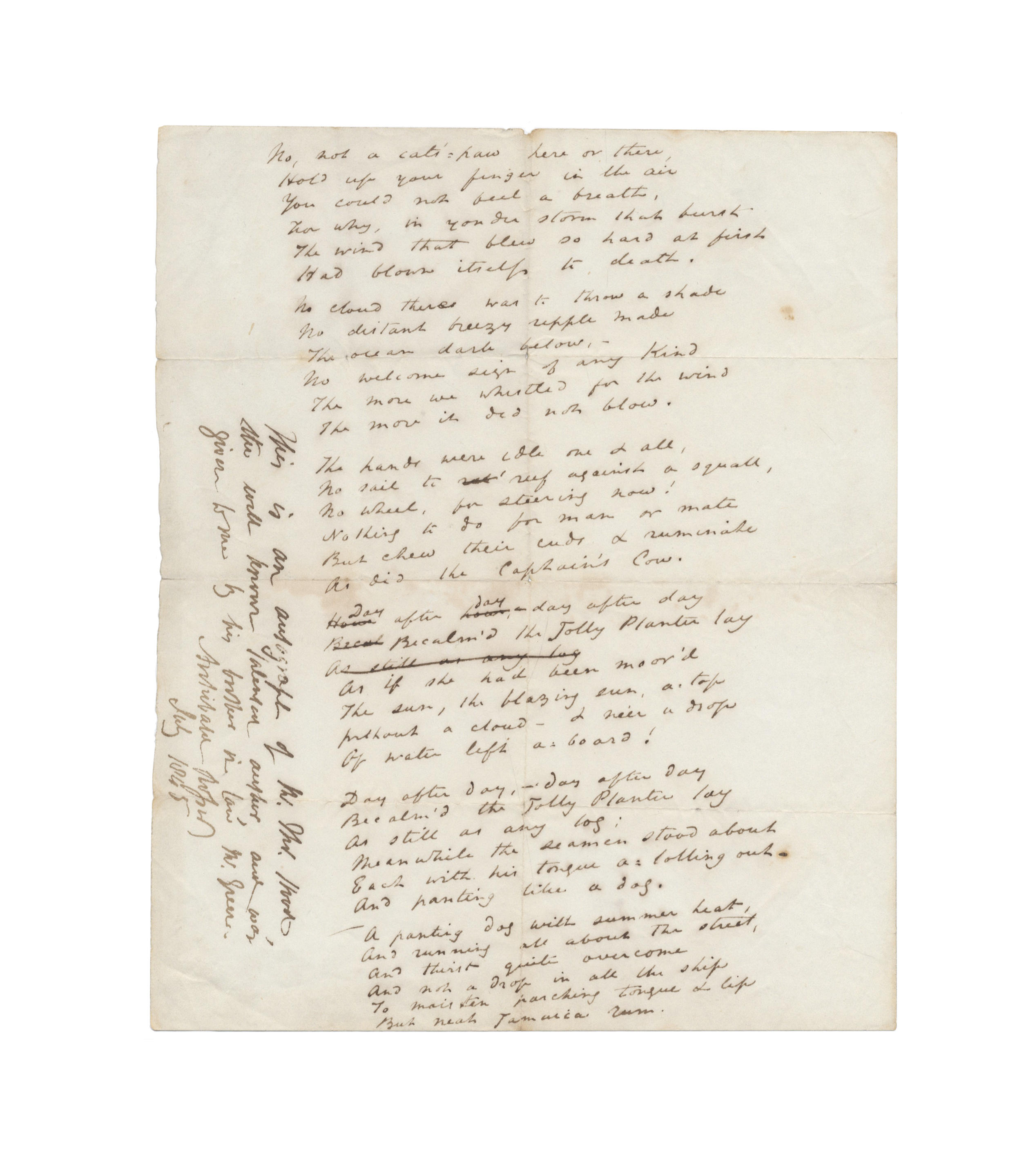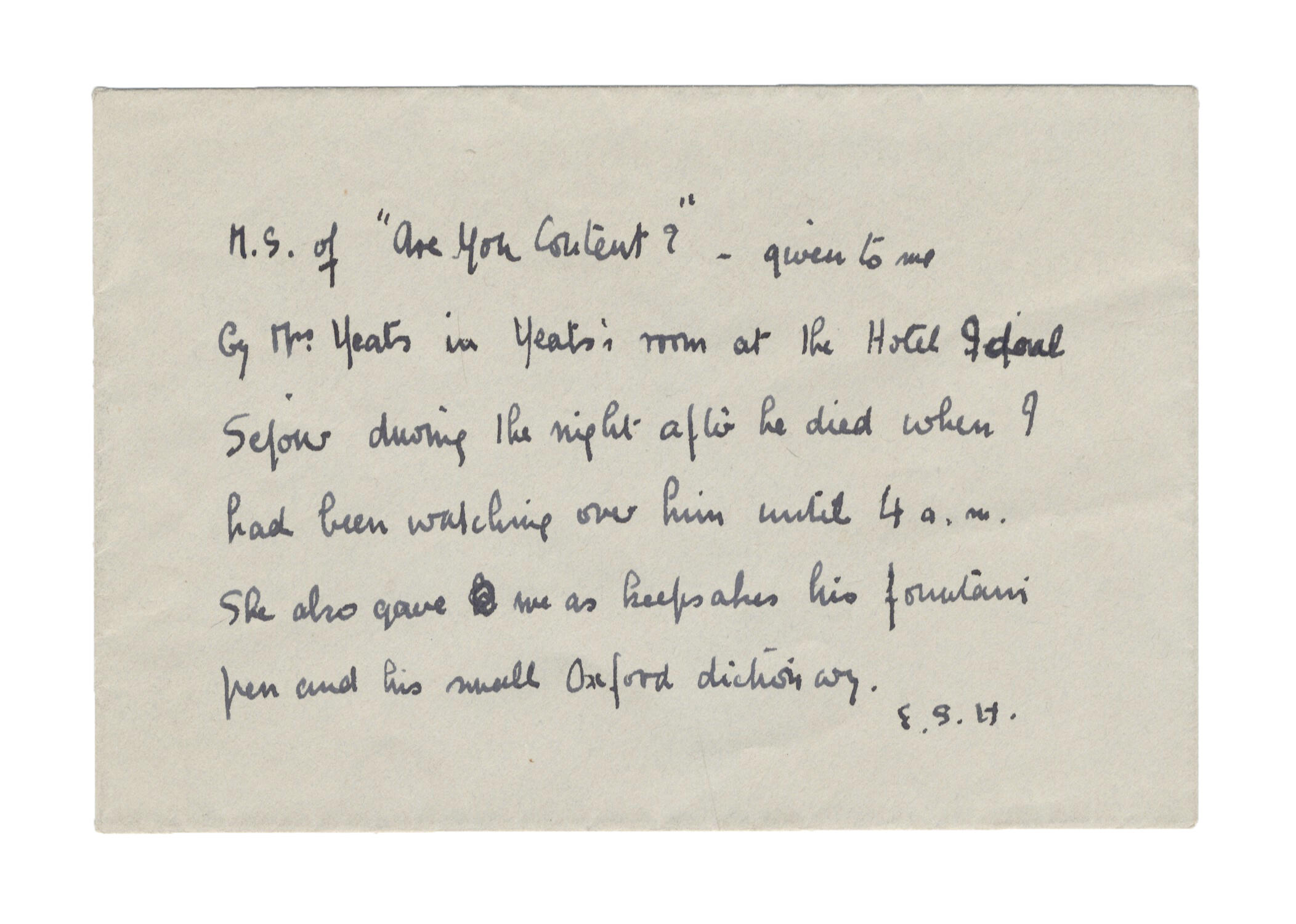AUTOGRAPH REVISED MANUSCRIPT OF HIS CELEBRATED BALLAD ['LORD ULLIN'S DAUGHTER'] (untitled herein), 56 lines in fourteen four-line stanzas with autograph revisions to six stanzas preserving reconsidered readings, in one rewriting three of the four lines; the poem is incorporated in an autograph letter signed ('T. Campbell' apparently added at the time of revision and in the same colour ink), to Richard 'Sharpe' in which Campbell offers the song to him 'which may not give you a pennyworth of amusement, but it will cost you threepence', allowing him to reserve his comments until they meet in person and explaining that the 'little Story is traditionally related of a Sprig of Nobility in the Highlands with which our family boasted kindred' and that he heard the story seven years before in the Highlands but only recently thought of making a poem of it ('...You will see that I am still in the street style...'), 2 pages, quarto, integral address leaf to Richard Sharpe, 15 Mark Lane, London, hand and stamped postal markings, postmarked 9 May 1805 A chieftain to the Highlands bound Cries Boatman do not tarry And I'll give thee a silver pound To row us Oer the ferry - Now who be ye would cross Lochgyle This dark & stormy water Oh I'm the chief of Ulva's isle And this Lord Ullin's daughter... The horsemen hard behind us ride If they our steps discover Then who will cheer my bonny bride When they have slain her lover - ... Oh haste thee haste thee the Lady cries Though tempests round us gather I'll meet the raging of the skies But not an angry father - ... Come back my child (he cried in grief) Quitt Quitt this raging water And I'll forgive thy Highland chief My daughter oh my daughter... 'LORD ULLIN'S DAUGHTER' IS ONE OF THE BEST-KNOWN SCOTTISH SONGS OF THE NINETEENTH CENTURY. There are several verbal differences between the present manuscript and the published version, including in stanza thirteen the reading 'Come back my child (he cried in grief) / Quitt Quitt this raging water...' for 'Come back! come back! he cried in grief / Across the stormy water...' The present manuscript has virtually no punctuation and Campbell's orthography bears witness to his Scottish origins (e.g. 'humand hand' and 'sckowl' for 'scowl'). The poem has been widely published. The ballad is usually said to have been first sketched in Mull in 1795 and elaborated at Sydenham in 1804. It was published with the first edition of Gertrude of Wyoming, 1809. Richard Sharp (1759-1835), known as 'Conversation Sharp' was a member of the firm Richard Sharp & Co of Mark Lane. He had a lifelong enthusiasm for politics and literature, was one of the original members of the Literary Society, and was a friend of Samuel Rogers, Thomas Moore and Horne Tooke and was generally well known to the chief people of his day. Sir James Mackintosh said that Sharp was the best critic he had ever known. No manuscript of this poem has appeared at auction in the last forty years, at least. PROVENANCE: D.C.C. Wilson.
AUTOGRAPH REVISED MANUSCRIPT OF HIS CELEBRATED BALLAD ['LORD ULLIN'S DAUGHTER'] (untitled herein), 56 lines in fourteen four-line stanzas with autograph revisions to six stanzas preserving reconsidered readings, in one rewriting three of the four lines; the poem is incorporated in an autograph letter signed ('T. Campbell' apparently added at the time of revision and in the same colour ink), to Richard 'Sharpe' in which Campbell offers the song to him 'which may not give you a pennyworth of amusement, but it will cost you threepence', allowing him to reserve his comments until they meet in person and explaining that the 'little Story is traditionally related of a Sprig of Nobility in the Highlands with which our family boasted kindred' and that he heard the story seven years before in the Highlands but only recently thought of making a poem of it ('...You will see that I am still in the street style...'), 2 pages, quarto, integral address leaf to Richard Sharpe, 15 Mark Lane, London, hand and stamped postal markings, postmarked 9 May 1805 A chieftain to the Highlands bound Cries Boatman do not tarry And I'll give thee a silver pound To row us Oer the ferry - Now who be ye would cross Lochgyle This dark & stormy water Oh I'm the chief of Ulva's isle And this Lord Ullin's daughter... The horsemen hard behind us ride If they our steps discover Then who will cheer my bonny bride When they have slain her lover - ... Oh haste thee haste thee the Lady cries Though tempests round us gather I'll meet the raging of the skies But not an angry father - ... Come back my child (he cried in grief) Quitt Quitt this raging water And I'll forgive thy Highland chief My daughter oh my daughter... 'LORD ULLIN'S DAUGHTER' IS ONE OF THE BEST-KNOWN SCOTTISH SONGS OF THE NINETEENTH CENTURY. There are several verbal differences between the present manuscript and the published version, including in stanza thirteen the reading 'Come back my child (he cried in grief) / Quitt Quitt this raging water...' for 'Come back! come back! he cried in grief / Across the stormy water...' The present manuscript has virtually no punctuation and Campbell's orthography bears witness to his Scottish origins (e.g. 'humand hand' and 'sckowl' for 'scowl'). The poem has been widely published. The ballad is usually said to have been first sketched in Mull in 1795 and elaborated at Sydenham in 1804. It was published with the first edition of Gertrude of Wyoming, 1809. Richard Sharp (1759-1835), known as 'Conversation Sharp' was a member of the firm Richard Sharp & Co of Mark Lane. He had a lifelong enthusiasm for politics and literature, was one of the original members of the Literary Society, and was a friend of Samuel Rogers, Thomas Moore and Horne Tooke and was generally well known to the chief people of his day. Sir James Mackintosh said that Sharp was the best critic he had ever known. No manuscript of this poem has appeared at auction in the last forty years, at least. PROVENANCE: D.C.C. Wilson.












.jpg)
Try LotSearch and its premium features for 7 days - without any costs!
Be notified automatically about new items in upcoming auctions.
Create an alert